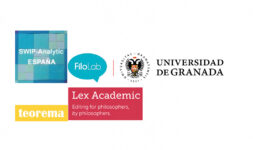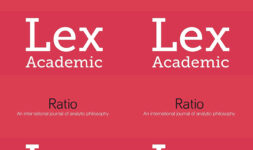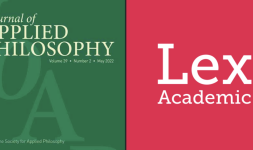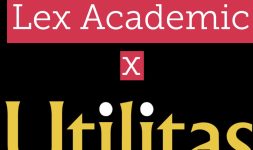
The Lex Academic Interview: Tom Morris
Our Founding Director Constantine Sandis in conversation with leading public philosopher and pioneering business thinker Tom Morris
World Book Day
In celebration of World Book Day 2024, we are offering our clients 20% off all monograph editing, translation, and indexing, as well as any book proposal bookings made today. To make use of this offer, please contact us today only, quoting WBD20.

Why Use Transcribers and Not Speech Recognition Software? | Lex Academic Blog
Researchers armed with accurate transcripts, produced with attention and sensitivity by professional transcription services, are best equipped to establish patterns, draw meaningful conclusions, and contribute substantively to collective knowledge. For this reason, the work of human transcribers remains, and will continue to be, deeply valuable in the age of AI.

How to Control Your Email (So It Doesn’t Control You)
7th June 1984 and a young television presenter called Jane Ashton is fronting a Thames TV programme called Database. As the introductory synth fades out, Ashton gestures towards a screen besides her onto which the Green family, a husband and wife, appear . ‘We’ll be linking from the Database studio to their home’, she promises, […]

‘Tis the Season to be… | Lex Academic Blog
For some academics – especially first-generation academics, or those not from academic families – returning home can mean encountering a family that has no idea what you do, or what the point of your research is. Why did you dedicate your life to studying the bubbles in washing up liquid?

Applying for PhD Funding | Lex Academic Blog
You might be the most capable scholar, producing exciting work, yet fail to get your PhD funded if you don’t pay extremely close attention to what a committee is looking for and provide precisely that.

AI Killed My Journal Submission
In April of 2023, I submitted a paper to a fairly well-known philosophy journal from a major publishing house. This was the second journal I’d submitted this paper to—it had been rejected from a different one years ago, with some helpful and generous comments, and I’d procrastinated sending it out again. I had a co-author […]

Lex Academic® Essay Prize Winners
We are delighted to announce that the winning paper of the Lex Academic® Essay Prize, in association with Philosophical Psychology‘s Special Issue “Understanding Bias” is ‘Linguistic justice in academic philosophy: The rise of English and the unjust distribution of epistemic goods’ by Peter Finocchiaro and Timothy Perrine. The paper appeals to the concept of epistemic injustice to frame the […]

World Philosophy Day 2023
In celebration of World Philosophy Day 2023, we are pleased to offer new clients submitting work in philosophy a 10% discount across all services for any bookings made between 16 November and 20 November. This includes pre-bookings for future work. Simply use code WPD10 when contacting us. Thanks to being spearheaded by two Oxbridge-educated academic philosophers, Lex […]

Teorema Publication of SWIP-Analytic Spain Lex Academic Essay Prize Winner
The winning paper of the 2022 SWIP-Analytic España Lex Academic Essay Prize has now been published with open access in the latest issue of the journal Teorema. The prize was awarded to Violeta Conde Borrego (Universidade de Santiago de Compostela), for the paper “Necessitism and Unrestricted Quantification”. Read the winning paper here: Violeta Conde Borrego […]

Lex Academic x Ratio
We are delighted to be collaborating with the international journal of analytic philosophy, Ratio, giving its submitting authors a 15% discount on our esteemed philosophy proofreading services. Our professional philosophy editors, who can provide everything from pristine formatting, technical proofreading, to substantive language editing (as needed), have guided hundreds of papers through the rigours of peer […]

Preparing For a New Academic Year as a Graduate Student | Lex Academic Blog
As a community of veteran academics, we have some thoughts that we’d like to share with you about making the most of the new academic year.

The UK Joins Horizon Europe
In a recent and highly anticipated move, the United Kingdom has officially re-joined the European Union's Horizon Europe programme as a full associate member.

AI Detection Tools Falsely Accuse International Students of Cheating
AI detectors tend to be programmed to flag writing as AI-generated when the word choice is predictable and the sentences are more simple. As it turns out, writing by non-native English speakers often fits this pattern, and therein lies the problem.

How to Choose the Right Journal for Your Work | Lex Academic Blog
Different types of journals are suitable for different stages of your career. Some scholars might value impact factors above all else; others care little for such metrics – in some fields, impact factor hardly registers. Top-class journals can have long turnaround times. Maybe the journal you choose looks good at first, but focuses on developing new methodologies when your contribution is a theoretical one. An article can also be rejected from a journal even if it’s well written and the perfect fit: perhaps they’ve just published an article on a similar topic, or they may simply be swamped with submissions and/or understaffed. The best protection from any of these frustrating rejections is to choose a journal early, and to choose it well.

Putting the Problem into the Work | Lex Academic Blog
For scholars, the question is not one of how we should fail better, but rather one of how we should better incorporate failure into our research and our writing. As Professor Tara Brabazon likes to say, you’ve got to ‘put the problem into the work’.

Transforming a PhD Chapter into a Journal Article | Lex Academic Blog
As a newly minted PhD, or student approaching the closing stages of your degree, you will already know what a peer-reviewed article is and why it is important to a scholarly career. A PhD chapter can come to life as an article, but it needs to be prepared a little differently; excised from the body of the thesis and made to live independently.

PhD Milestones | Lex Academic Blog
Starting a PhD is a bit like reaching the Everest Base Camp. If you want to reach that metaphorical summit, trekking across a stage in a Tudor bonnet, you’ll need to pass several milestones of challenges and tests – the equivalent of Everest’s four camps. From registration to progression, submission, the viva, and beyond, each step of your PhD presents its own difficulties and similarly requires acclimatisation.

Getting In and Getting On During Doctoral Study | Lex Academic Blog
Academic heavyweights can lend considerable cachet to a young researcher’s CV, but they typically only offer scant and patchy supervision to their attention-starved students. This is a trade-off about which prospective PhD candidates ought to be mindful. Namedropping a heavyweight or two when listing one’s PhD supervisors may pay dividends down the line, as those name-brand references will no doubt open many doors during a lifetime of academic job applications, but it may be a challenging, lean, and lonely doctoral experience.

PhD Vivas in the UK | Guest Blog by Professor Gary Browning
A PhD is a project that takes a long time, three years and counting, and now it has come to an end. But what is the end? The writing might have stopped, but the examination remains. It looms large as soon as the thesis is completed.

2,300 Years of Indexing: From the Library of Alexandria to AI
If you visit the librarianship section of a library and scan the books on ‘indexing’, you’ll find broadly three kinds. The first are the practical guides. How should one actually go about creating an index? For the purposes of this blog, we’re not so interested in these (although we have a guide of our own), […]

The 2023 Lex Academic Philosophy Scholarship
We are delighted to announce that the 2023 joint winners of the international Lex Academic Philosophy Scholarship are Stella Moon (University of California, Irvine) and James Clark Ross (University of Southampton). We received a very high number of applications, but the panel unanimously agreed that their thesis projects were remarkably original, thoroughly grounded in the […]

Examining a PhD in the UK: 10 Ways to Lead a Viva
In this blog post, we offer advice to would-be external examiners on how to effectively approach and manage doctoral examinations in the UK setting.

SWIP-Analytic Spain Essay Prize Winner 2022-23
The SWIP-Analytic Spain Lex Academic Essay Prize (2022-23) is awarded to Violeta Conde Borrego (Universidade de Santiago de Compostela).

Penn State and Purdue
We are extremely proud to announce that Lex Academic® is now an official supplier to Penn State University and Purdue University.

Corporate Member of the Chartered Institute of Editing and Proofreading
We are proud to be joining the Chartered Institute of Editing and Proofreading as a Corporate Member.

The Lex Academic Interview: Mario Von Der Ruhr
Lex Academic co-founder, Professor Constantine Sandis, speaks with the Editor-in-Chief of Philosophical Investigations, Dr Mario Von Der Ruhr.

Who’s Afraid of Reviewer #2?
No one is likely to argue that academia attracts many of the sorts of people who create spaces for collaboration, get involved with their colleagues’ projects, and value a supportive community that they lovingly nurture. As peer reviewers, some of these academics might even write things like ‘this journal is lucky to publish your article’, […]

SWIP Italia Lex Academic Essay Prize
SWIP ITALIA LEX ACADEMIC ESSAY PRIZE – 2024 EDITION SWIP Italia, in collaboration with Rivista di Estetica and Lex Academic, is happy to announce the “SWIP Italia – Lex Academic Essay Prize 2024”. The award will be conferred to the best feminist philosophy essay authored either by an Italian woman philosopher or by a woman […]

East & Southeast Asia Philosophy Publishing Workshop
The Lex Academic Philosophy Publishing Workshop: East & Southeast Asia Date: 24 May, 2023 Time: 18:00–19:30 (Japan); 17.00–18.30 (Taiwan); 16.00–17.30 (Thailand); 10.00–11.30 (UK). Participants Kanit (Mitinunwong) Sirichan (Chulalongkorn University, Thailand) Kengo Miyazono (Hokkaido University, Japan; Editor, Philosophical Psychology; Associate Editor, Philosophical Explorations) Sascha Benjamin Fink (University of Leipzig, Germany; Co-Editor-in-Chief, Philosophy and the Mind Sciences) Ying-Tung […]

Applying for a Research Grant: Some Dos and Donts | Andrei A. Buckareff
Suppose you’ve found a funding body to which you are interested in submitting a proposal for a grant. What now? Assuming that this is your first grant application, we recommend the following: collaborate with a veteran; go small; and find a niche that fits well with the vision of the agency from which you are requesting a grant.

2024 Lex Academic SIFA/Argumenta Prize
Following the success of the 2023 Lex Academic Prize, won by Dr Federica Berdini for her article, ‘Coping: A Philosophical Exploration’, we are pleased to announce the 2024 Lex Academic Prize in the philosophy of action and ethics in the analytic tradition. This prize is jointly sponsored by Lex Academic, the Italian Society of Analytic […]

Where are all the women? | International Women’s Day
Our thoughts on International Women’s Day invariably return to a key piece of feminist literature, Virginia Woolf’s A Room of One’s Own, which is well known for stating that ‘a woman must have money and a room of her own if she is to write fiction’. Woolf’s essay talks us through how she came […]

Five Reasons Why Writing Your First Article Need Not Detract from Writing Your Dissertation | Lex Academic Blog
Should you be publishing peer-reviewed articles while in grad school? In the sciences, the response to this question would be a resounding 'yes'. In the humanities and social sciences, however, not everyone does this. Some prefer to start publishing only after defending their thesis.

Romance your Research | Lex Academic Blog
It’s hardly a surprise that some days you want to walk (run) away from your research out of boredom and frustration or seek a get-out clause in the desperate hope that absence will make the heart grow fonder. But escaping from the relentless admin and tedious Teams meetings that sit alongside a research career would also mean leaving your one true love.

SIFA Prize-Winner 2023
We are very pleased to announce that the winner of the 2023 Lex Academic Prize in the philosophy of action and ethics in the analytic tradition is Dr Federica Berdini (Postdoctoral Fellow at the Centre for Ethics, University of Toronto) for her article, "Coping: A Philosophical Exploration".

How to Give and Receive Feedback | Lex Academic Blog
As academics, and even as students and managers, we’re asked to review and give feedback on everything from how a conference workshop went to our peers’ theories and methods. When we give feedback in our professional lives, we are fundamentally letting our thoughts be known.

The Lex Academic Philosophical Psychology Essay Prize
We are delighted to be offering the Lex Academic® Essay Prize in association with Philosophical Psychology‘s Special Issue “Understanding Bias“. The Prize will be awarded to the author of the best essay on the understanding of linguistic discrimination, a philosophical preoccupation of both the journal and Lex Academic. Benefits include: Editorial services on the prize-winning […]

The Perfect Book Title | Lex Academic Blog
For non-fiction in particular, including academic titles, the needs of a library and bookshop give us a seemingly obvious place to start when creating our own titles. Anyone penning a title today will obviously require it to be clear, descriptive, attractive, consistent with the content and regular across all future versions.

Philosophers’ Imprint x Lex Academic
We are proud to be an official copyeditor of Philosophers’ Imprint, the esteemed peer-refereed journal founded by Stephen Darwall and J. David Velleman and published by Michigan Publishing at the University of Michigan. The Imprint was established in the spirit of the Open Access movement, whose mission is to promote a future in which funds […]

SWIP-Analytic Spain Lex Academic Essay Prize 2022
In collaboration with FiloLab UGR and Teorema, we are thrilled to announce the SWIP-Analytic España Lex Academic Essay Prize 2022.

Passing Your Viva with No Corrections: Towards an Outstanding PhD | Lex Academic Blog
The meaning we associate most immediately with ‘outstanding’ is perhaps that of ‘excellent’ or ‘first-rate’: an outstanding PhD is one that ranks high on some sort of classificatory scheme. But this meaning, I suspect, is derived from its more literal meaning, that of standing out from the crowd. Those PhDs that do this will indeed be the few that make it into the top tier of PhDs that are passed with ‘no corrections’ (cum laude or summa cum laude in other systems such as in Germany or the Netherlands) – but this quantitative feature is only a result of their qualitative merit: a truly outstanding PhD is one that stands out because of its original insight.

How to Get Copyright Permissions for Your Book | Lex Academic Blog
Obtaining the rights to reprint photographs, graphics, or lines of poetry is a notorious faff, which is why we offer a fully comprehensive professional text and image permissions service that takes all the stress and anxiety away for you. But, in this blog, we’ll review the things you need to consider when sourcing images or quotations to populate your academic books and articles yourself.

Lex Academic in the Media
‘Lex Academic a Success in Any Language‘, Business Weekly, 6 Oct, 2021. ‘Levelling the Linguistic Playing Field within Academic Philosophy‘, Daily Nous, 13 Oct, 2021. ‘Unconscious Bias or Deliberate Gatekeeping‘, The Philosophers’ Magazine, Oct 2021. ‘Analytic Philosophy Has a Language Problem‘, IAI News, 7 April, 2022. ‘Reframing The Academic Realm With Lex Academic CEO Louise Chapman‘, […]

Expanding the Canon – ECAP 11
We are thrilled to announced that Lex Academic will be sponsoring an invited symposium on "Expanding the Canon” with Ruth Hagengruber (Germany) and Sabrina Ebbersmeyer (Denmark) at ECAP 11.

British Wittgenstein Society
We are pleased to announce that members of the British Wittgenstein Society now receive 10% off all our services.

Essay Prize I Philosophical Psychology | Linguistic Discrimination
THE LEX ACADEMIC ESSAY PRIZE As part of Philosophical Psychology‘s Special Issue “Understanding Bias”, we are delighted to be sponsoring an Essay Prize on linguistic discrimination. The prize will be awarded to the author of the best essay on the understanding of linguistic discrimination, a philosophical preoccupation of both the journal and Lex Academic. Benefits […]

World Philosophy Day 2022
In anticipation of World Philosophy Day 2022 on 17 November 2022, we are pleased to offer new clients submitting work in philosophy a 10% discount across all services from Monday 14th to Sunday 20th November. Thanks to being spearheaded by two Oxbridge-educated academic philosophers, Lex Academic is uniquely positioned to offer rigorous philosophy editing […]

Lex Academic x Philosophical Investigations
We are delighted to be collaborating with the Wiley-Blackwell journal Philosophical Investigations, offering its submitting authors a 15% discount on our world-class English language editing services, from light-touch copy-editing to substantive language editing.

Paul Craddock
We are pleased to announce that Dr Paul Craddock is joining our team as Chief Copywriter.

How to Get a Book Contract as an Independent Researcher | Lex Academic Blog
Acquiring a book contract is often a lengthy process. However, a good idea, a clear sense of your book’s argument and contribution to scholarship, as well as a well-researched target market, will make all the difference in finding the right publisher.

PURA ERC x Lex Academic
We are overjoyed to have been contracted as the copy editors for the PURA ancient lexicography ERC Consolidator project at Ca’ Foscari University of Venice. The project is devoted to the theories of linguistic purism developed in ancient Greek culture and how they were received in later ages. We were recruited for it on the basis of our unparalleled acquaintance with classical philology.

SIFA x Lex Academic x Argumenta
We are pleased to announce that the Italian Society of Analytic Philosophy (SIFA), Lex Academic, and the journal Argumenta are jointly sponsoring an annual prize in philosophy of action and ethics in the analytic tradition.

The Alan Turing Institute x Lex Academic
We are extremely proud to announce that Lex Academic® is now an official supplier to The Alan Turing Institute. We look forward to supporting the Institute with our expert academic editing and translation services.

How to Prepare for your PhD Viva | Lex Academic Blog
In many parts of the world, a thesis defence retains its sense of theatre. In Sweden, you may be asked to literally nail your thesis to a wooden board. In Germany, once your defence is over, it is possible your supervisor will pull you down the street on a mobile throne. In Finland, you receive a doctoral sword and a hat. The public, performative oral component of such systems endures, though defanged and more or less a part of the ceremony for those who have already proved themselves. In the UK, the opposite is the case.
Lex Academic x British Wittgenstein Society
Lex Academic® champions research that addresses the multifaceted challenges of the 21st Century. This is why we are proud to support the important work carried out by British Wittgenstein Society through our sponsorship of its website.

How Common is Passing with Major Corrections from a PhD? | Lex Academic Blog
In the UK, a study of over 26,000 PhD candidates revealed that only 16% of students were awarded major corrections, while 3.3% of students failed their viva outright. Nevertheless, receiving major corrections presents a much-feared outcome for doctoral candidates. Before we think about how major corrections can be avoided, it is worth looking at them from a different perspective, addressing the fear itself by understanding the mechanism they are part of.
Lex Academic x e-Glow
We are honoured to be an official founding partner of the European Institute for Global Well-Being.

The 2022 Lex Academic Classics Scholarship | Lex Academic Blog
We are delighted to announce that the 2022 winner of the international Lex Academic Classics Scholarship is Leah Wild from Christ’s College, University of Cambridge.

Publishing a Trade Book in Five Steps | Lex Academic Blog
Some writers are directly invited to publish. Some nobble agents at parties. Others relentlessly submit proposal after proposal until an agent or publisher finally gives them a break. No two writers have the same journey to publication. Here are, nevertheless, five important stages to publishing your trade book.

How Sensitivity Readers Can Improve Your Work | Lex Academic Blog
Do sensitivity readers offer vital perspectives that help writers avoid causing offence, or do they represent the creeping tyranny of cancel culture?

Choosing the Right Publisher for Your Work | Lex Academic Blog
Unless you are exceptionally lucky, the process of publishing your work can be challenging, emotional, and fraught with tough decisions. In light of this, it is really important to place your work in the best possible hands.

Lex Academic x Journal of Applied Philosophy
We are delighted to be collaborating with the Journal of Applied Philosophy, offering its submitting authors a 15% discount on our esteemed English language editing services, from light-touch copy-editing to more substantive language editing.

How to Keep a Research Journal | Lex Academic Blog
For many, especially early career researchers, the research journal remains a mystery. In this blog post, Dr Nicole Brown, author of Making the Most of Your Research Journal, outlines some key tenets of research journaling.

A Short History of the Footnote | Lex Academic Blog
Footnotes divide opinion. Noel Coward once said that ‘having to read footnotes resembles having to go downstairs to answer the door while in the midst of making love’. Is the footnote, then, a scholarly facilitator or a self-indulgent textual thwart?

Insider Tips on Getting Published in English-language Journals | Karen Englander, Ph.D. | Lex Academic Blog
When English is your second language (and even when it isn't), passing through a journal's peer review process can be challenging. What is an author to do to improve their prospects of sailing through peer review? We have some ideas.

Lex Academic x Utilitas
We are delighted to be officially partnering with the journal Utilitas, offering its submitting authors a 15% discount on our esteemed philosophical editing services. https://www.cambridge.org/core/journals/utilitas/information/instructions-contributors

How to Surmount ‘Blank Page’ Syndrome | Lex Academic Blog
One of the biggest challenges of undertaking an extended piece of research, whether it’s facing your PhD or fulfilling a brief from a publisher, is simply getting the words down. There is nothing more daunting than a large word count to fulfil, especially if English is not your native language. Here are a few pointers about getting into good, manageable writing habits.

Insights into independent research: Moving out of traditional academia and how to keep your research engaging | Lex Academic Blog
A level of social stigma exists around independent academic research and researchers. And these biases die hard. Here, we look at the challenges and opportunities that exist within this liminal academic space.

Decoding a Book Proposal Form | Lex Academic Blog
Publishers' book proposal forms can feel broad and vague with not a huge amount of guidance on what each of the questions and sections is asking of you. With that in mind, Liza Thompson of Bloomsbury thought the most useful thing to do would be to work through the main sections of a proposal form and hopefully ‘decode’ them.

‘Coming Out’ as Working Class in Academia | Lex Academic Blog
'Since my "coming out", I’ve been told by middle-class academics I don’t belong in academia. And people I’ve known most of my life have accused me of being a class traitor.' We spoke to Dr Paul Craddock about getting on (and getting along) in academia.

Mastering the Move from PhD to Postdoc/Junior Lecturer: A How-To Guide | Lex Academic Blog
Planning your move from PhD to postdoc can come at a time when you are time-poor, burnt out, and struggling to remember why you ever wanted an academic career. In this post, we enumerate a few things to remember at this time of fraught (but thrilling) transition.

Mastering the Move from Master’s to Doctoral Study: A How-To Guide | Lex Academic Blog
After admission to a PhD program, many students may find themselves struggling to navigate new expectations for study. Once installed firmly at a workspace, what should a new doctoral student do?

The Necessity of Subject Matter Expertise for Academic Translation | Lex Academic Blog
Mistranslations are often funny...until they're not. Here's our view on why it's worth hiring a subject matter expert to translate your text.

The Transition to Writing in English in Non-Anglophone Institutions
The internationalisation of research has undeniably resulted in its Anglicisation. This raises the question of when researchers in non-Anglophone institutions begin to write academically in English.

Why a Great Thesis Doesn’t Always Make a Great Book | Lex Academic Blog
One of the most common reasons why publishers reject proposals for PhD-derived monographs is that they give the impression that the author does not understand the difference between a thesis and a book. In this post, we will look at some of the differences.

On Writing ‘I’: The First Person in Academic Prose | Lex Academic Blog
The use of the first person ‘I’ has traditionally been associated with arrogance and poor scholarship. Today, however, the first person appears regularly in academic writing, particularly in the humanities. In this post, we dissect the arguments against writing ‘I’ and suggest occasions where it might be used productively.

‘What’s in a name?’: How to Title Your Publications | Lex Academic Blog
A well-crafted title generates more reader engagement, increasing the citation rate and impact of a publication. For many of us, though, coming up with a title is challenging. In this post, we will share a few tips on titling publications.

Why Research Outputs Should Be Open Access | Lex Academic Blog
Open access publishing is increasingly common and is often perceived as a more positive and inclusive way of disseminating academic research. In this post, we explore types of open access publishing and the benefits of this model.

Benefits and Drawbacks of Open Peer Review | Lex Academic Blog
Concerns about implicit bias in traditional methods of peer review, including double-blind, have prompted some journal publishers such as PLOS and Frontiers to implement an open peer review policy. In this post, we discuss the potential benefits and drawbacks of this system.

From PhD to Monograph: How to Revise Your Thesis for Publication | Lex Academic Blog
Most early career researchers in the arts and humanities are encouraged to see their PhD thesis as a monograph-in-waiting – and with good reason. Here's our how-to guide to revising a thesis for publication and kick-starting an academic career.

Viva, Soutenance, Disputation: How PhD Students around the World Defend Their Thesis | Lex Academic Blog
In the UK, it's called a 'viva'. In the US, it's a 'defense'. Have you ever wondered how PhD students around the world defend their thesis?

How to Avoid Major PhD Corrections | Lex Academic Blog
As a follow-up to our recently published how-to guide to avoiding minor PhD corrections, we thought it would be useful to produce a post on major corrections. Here's some advice on how to avoid them.

How to Avoid Minor PhD Corrections | Lex Academic Blog
Passing your PhD with minor corrections is what most students aim for. But who wouldn't prefer to pass with no corrections? Here are a few tips for avoiding even minor corrections.

Is Indexing an Art or a Science? | Lex Academic Blog
As any author who has tried to compile their own index will tell you, it’s easy to underestimate the sheer amount of skill, knowledge and effort that goes into creating a first-class index. Like so many of the finer things in life, indexing is both an art and a science.

How a lack of authorial voice can lead to journal rejection | Lex Academic Blog
Developing a compelling authorial voice can present particular challenges within academic writing, in which objectivity of tone is privileged, and reliance on the first person is often scorned.